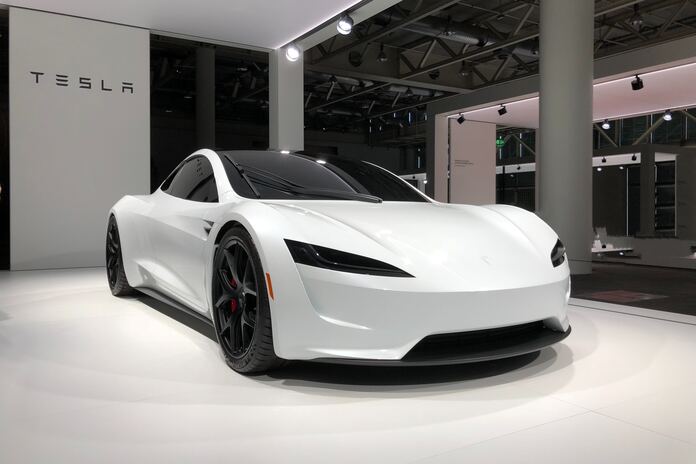Tesla Stock (NASDAQ:TSLA)
Should we no longer look to electric vehicles (EVs) as the way forward for the automotive industry? Recent earnings reports from Toyota indicate that the tide may be turning, with the Japanese automaker’s profits outpacing those of EV giant Tesla. This finding suggests that the tide may be turning in favor of Toyota.
The majority of the world’s automobile manufacturers have released their financial results for the first quarter, and conventional car manufacturers have the upper hand over electric vehicle companies. The most recent reports from companies like Toyota Motor simply look better than those that have been released by Tesla, which has become the industry standard for electric vehicles (EVs).
In recent years, the automotive industry has undergone a period of rapid evolution, with the introduction of electric vehicles (EVs) ushering in a new era of innovation and sustainability in the industry. Tesla has been at the forefront of this movement, gaining significant attention and market share with its electric cars and innovative technology. Tesla has been at the forefront of this movement. Meanwhile, Toyota has been quietly making strides of its own, leveraging its established reputation and robust supply chain to boost its profits and surpass Tesla’s earnings in the first quarter of 2021. This is expected to happen.
On Wednesday, Toyota (NYSE:TM) announced that its operating profit for the first quarter was $4.6 billion, while its sales came in at almost $72 billion. The financial analysts on Wall Street anticipated an operating profit of $3.6 billion, based on sales of $67 billion. It’s a solid win, helped in part by the declining value of the Japanese yen. The operating profit for the previous quarter, which was $3.6 billion, increased significantly.
In stark contrast to Toyota, Tesla (NASDAQ:TSLA) saw a precipitous decline in its operating profit during the first quarter, falling from $3.6 billion the year prior to $2.7 billion. Demand for Tesla electric vehicles was helped by price cuts across the globe, but this came at the expense of profitability.
In the future, Toyota anticipates that its fiscal 2024 profit will reach approximately $22 billion, which is an increase from the slightly more than $20 billion that was generated in fiscal 2023. (The month of March marks the end of Toyota’s fiscal year.)
The primary factor contributing to better results is an increase in production. Toyota anticipates that its total vehicle production will reach 10.1 million units in the fiscal year 2024, which is an increase from the 9.1 million units produced in the fiscal year that has just come to a close.
Toyota is striving to perform better than its competitors. The operating profit forecast for 2023 at Ford Motor (NYSE:F) is approximately $10 billion, which is a decrease from the approximately $10.4 billion forecast for 2022. General Motors (NYSE:GM) projects that its operating profit will be approximately $12 billion in 2023, which is a decrease from the previous forecast of $14.5 billion.
Tesla doesn’t provide full-year guidance. The electric vehicle giant is expected to report an operating profit of $11.6 billion in 2023, according to current estimates from Wall Street. This figure is down from the $13.7 billion reported in 2022.
Following the release of the results, trading on Wednesday saw a gain of approximately 0.8% for Toyota’s American depositary receipts (ADRs) that are listed in the United States. Both the S&P 500 (SPX +0.45%) and the Dow Jones Industrial Average (DJIA –0.09%) are currently in the red, with losses of approximately 0.1% and 0.2%, respectively.
Over the course of the previous year, Toyota ADRs experienced a loss of approximately 15% going into trading on Wednesday. Investors’ excitement about the sector has been dampened somewhat as a result of rising interest rates and falling affordability of vehicles. Over the past year, shares of Ford and GM have decreased by approximately 11% and 14%, respectively, while the S&P 500 has increased by approximately 3% over the same time period.
Although traditional automakers’ stock performance has lagged behind that of the market overall, it is still superior to that of electric vehicle (EV) manufacturers. Over the course of the past year, the share prices of Rivian Automotive (NASDAQ:RIVN), Lucid Group (NASDAQ:LCID), Fisker (FSR), and Tesla have each decreased by approximately 29%, 54%, 34%, and 37%, respectively.
EV manufacturers are typically startups, which means that their shares are considered growth stocks. Growth stocks are known to perform poorly in conditions where interest rates are increasing. However, the poor performance can also be attributed to factors that are unique to the company. Both Rivian and Lucid have had a difficult time increasing their electric vehicle production. It took longer than expected for Fisker to receive the final approvals necessary to sell its vehicles in Europe, which resulted in a reduction in the 2023 projections. As was mentioned earlier, Tesla has decreased their prices in an effort to help increase demand.
The price cuts that Tesla has implemented have had an effect on virtually all manufacturers of electric vehicles (EVs) around the world. Tesla is the company that has the largest market share for fully electric vehicles.
amidst a more difficult economic climate. Traditional automobile manufacturers have a track record of consistent profitability, which excites investors more than money-losing electric vehicle manufacturers.
The Contribution of Electric Vehicles to Toyota’s Profits
Although Toyota’s success is remarkable, it is essential to remember that electric vehicles (EVs) continue to contribute significantly to the company’s bottom line. In point of fact, Toyota reported that its sales of electrified vehicles, including both hybrid and plug-in hybrid models, increased by 150% in the first quarter of 2021. This indicates that there is still a significant demand for environmentally friendly transportation options, despite the fact that conventional gasoline-powered automobiles may still be the industry’s primary source of revenue.
The Outlook for the Electric Vehicle Market
Therefore, what does the success of Toyota mean for the future of the electric vehicle market? Despite the fact that it is abundantly clear that conventional gasoline-powered automobiles aren’t going anywhere anytime soon, it is also abundantly clear that electric vehicles are here to stay. In point of fact, a great number of other automakers are stepping up their production of electric vehicles (EVs) and making significant investments in research and development in order to keep up with the shifting winds.
However, it is important to keep in mind that electric vehicles (EVs) are still confronted with a number of obstacles, the most significant of which are range anxiety concerns, the lack of readily available charging infrastructure, and the higher cost of EV models in comparison to conventional automobiles. As a result of this, it is highly likely that traditional gas-powered cars will continue to coexist alongside electric vehicles for the foreseeable future, with each type of vehicle catering to a different set of requirements and preferences held by customers.
Featured Image: Unsplash @ Tesla Fans Schweiz















